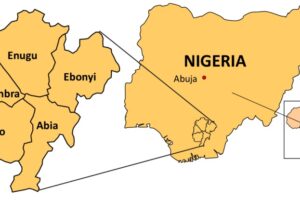The devastating consequences of Human Capital Flight on Nigeria’s Economic Development

Christian C. Madubuko, PhD.
The phenomenon of human capital flight, also known as the brain-drain (Jakpa in our local parlance), has become a stark reality in Nigeria. The country is facing a severe crisis as its brightest and most talented professionals, including medical doctors, engineers, accountants, economists, lawyers, and many others, are fleeing the country in search of better life opportunities abroad.
This exodus has significant negative effects on Nigeria’s economic development, particularly in the areas of education and healthcare. The irony is that these professionals are leaving behind a trail of devastation, as they flee in search of better life opportunities in Europe, America, Canada, Australia, New Zealand, Asia, and other developed regions.
This paper will delve into the push-pull factors that drive these talented individuals away from their homeland and towards foreign shores. I will examine the Revenstein-Lee’s Push-Pull Theory, which posits that both push factors (unfavourable conditions in the home country) and pull factors (attractive conditions in the destination country) contribute to human capital flight.
Furthermore, I will discuss the devastating consequences of this phenomenon on Nigeria’s educational system, health sector, and overall economic development. I will offer some suggested solution and advice to President Bola Ahmed Tinubu on the way forward.
Push Factors: Why Nigerian Professionals Flee
The push-pull theory, as propounded by Revenstein and Lee, provides a useful framework for understanding the factors driving this migration. According to this theory, individuals are motivated to migrate by both push factors (unfavourable conditions in their home country) and pull factors (attractive conditions in their destination country).
In Nigeria’s case, the push factors are numerous and formidable. Corruption, unemployment, insecurity, hunger, lack of social amenities, low wages, and a lack of hope in government are just a few examples of the factors driving young professionals to seek opportunities abroad.
Firstly, corruption is rampant in Nigeria, and it has created a culture of impunity. Bribery and extortion are common practices that have become ingrained in the society. This environment of corruption creates a sense of uncertainty and hopelessness among young professionals, making them more likely to seek opportunities abroad where they can work in a transparent and fair environment. In fact, young professionals are often forced to bribe officials to access basic services or secure contracts, leading to moral decay and a loss of motivation.
Secondly, unemployment is a major problem in Nigeria. The country has one of the highest rates of unemployment in the world. Many young graduates are unable to find employment in their chosen fields, leading to frustration and disappointment. This lack of job opportunities makes them more likely to seek employment abroad where they can utilize their skills and qualifications.
Thirdly, insecurity is a significant concern in Nigeria. Kidnapping, armed robbery, and terrorism are common occurrences that have created a sense of fear and uncertainty among citizens. Young professionals are more likely to flee the country due to concerns for their safety and well-being.
Fourthly, hunger is a pervasive problem in Nigeria. Many people struggle to access necessities like food and water. This lack of access to basic amenities creates a sense of desperation among young professionals who are forced to seek opportunities abroad where they can earn a decent living.
Fifthly, lack of social amenities is another significant push factor. Young professionals often struggle to access basic social services like healthcare, education, and transportation. This lack of access to social amenities creates a sense of discontentment among young professionals who are forced to seek opportunities abroad where they can enjoy better living standards.
Sixthly, low wages are a major issue in Nigeria. Many young professionals earn meagre salaries that do not allow them to live comfortably. This low wage structure creates a sense of dissatisfaction among young professionals who are forced to seek higher paying jobs abroad.
Additionally, lack of Hope in Government and lack of trust in government institutions and leaders creates a sense of hopelessness among citizens.
Pull Factors: Why Professionals are Attracted to Foreign Countries
On the other hand, the pull factors are equally significant. Developed countries like the United States, Canada, Australia, and those in Europe offer attractive job opportunities with better pay scales. These countries also provide a stable and secure environment that is conducive to work and personal growth.
Amongst other things, several pull factors attract Nigerian professionals to foreign countries:
Better Job Opportunities: Developed countries offer better job prospects, higher salaries, and more secure working conditions.
Quality Education: Foreign countries provide access to quality education and training programs that are not available in Nigeria.
Better Working Conditions: Professionals are attracted to foreign countries with more organized working conditions, better infrastructure, and less bureaucracy.
Higher Wages: Higher salaries and benefits packages are often available in foreign countries.
Social Security: Foreign countries offer comprehensive social security systems, including healthcare and pension plans.
The Consequences of Human Capital Flight
The effects of human capital flight on Nigeria’s economy are far-reaching and devastating. The loss of skilled professionals has significant implications for the country’s economic development. In the short term, it exacerbates the problems of unemployment and underemployment. In the long term, it undermines the country’s ability to develop its human capital base.
In education sector:
The departure of medical doctors’ leaves behind quacks who may not possess the necessary skills or training to provide quality healthcare services.
The loss of engineers hinders the development of critical infrastructure projects such as roads, bridges, and power plants.
The exodus of accountants and economists leaves behind a shortage of skilled professionals who can manage the country’s finances effectively.
The departure of lawyers hinders access to justice as many people struggle to find qualified legal representation.
In healthcare sector:
The loss of medical doctors’ leaves behind a shortage of skilled healthcare providers who can respond effectively to public health emergencies.
The departure of nurses and other healthcare professionals leaves behind a shortage of trained personnel who can provide quality healthcare services. The exodus of pharmacists hinders access to essential medicines and healthcare services.
In fact, not only the above highlighted factors. The consequences of human capital flight are far-reaching and devastating.
For example, it results in the following:
Brain Drain: The loss of skilled professionals leads to a brain drain that can take decades to recover from.
Service Delivery Gap: With few skilled professionals remaining in Nigeria, essential services such as healthcare and education suffer from inadequate staffing.
Economic Growth: The exodus of skilled professionals hampers economic growth by reducing the pool of talent available for innovation and entrepreneurship.
Dependence on Foreign Aid: Nigeria becomes increasingly dependent on foreign aid to plug the skills gap.
The Psychological Impact: The exodus of skilled professionals also has a profound psychological impact on those who remain in Nigeria. Many young graduates feel demotivated and disillusioned, as they watch their peers leave the country in search of better opportunities. This can lead to a sense of hopelessness and desperation, as they struggle to find employment or make ends meet. It might result in high rate of social crimes.
The Role of social media: social media has played a significant role in perpetuating the brain drain. Social media platforms like Twitter, Facebook, and LinkedIn have created a platform for professionals to share their experiences and connect with others who have left the country. This has created a sense of community among expatriates and has made it easier for them to network and find job opportunities abroad.
Recommendations and an Advice for President Bola Ahmed Tinubu
I urge you to take immediate action to address this crisis.
Here are some recommendations:
Improve Governance: Launch an all-out war against corruption by implementing policies that promote transparency and accountability.
by strengthening institutions and ensuring accountability at all levels.
Invest in Education: Invest heavily in education by providing quality infrastructure and resources for our educational institutions at all levels to create a pool of skilled professionals who can compete globally.
Create Jobs: Create job opportunities through entrepreneurship programs and small-scale industries that cater to local needs.
Improve Infrastructure: Invest in modern infrastructure development projects that provide quality healthcare facilities, quality education, and adequate housing.
Raise Salaries: Increase salaries for public servants and private sector employees to ensure a decent standard of living.
Promote Diaspora Engagement: Establish programs that engage Nigerian professionals in the diaspora with their homeland to leverage their expertise and resources.
Establish Public-Private Partnerships: Foster partnerships between government agencies and private sector organizations to drive innovation and entrepreneurship.
Improve Healthcare: Improve healthcare services by providing adequate funding for our healthcare institutions.
Promote Social Amenities: Provide access to basic social amenities such as water supply, electricity, transportation systems.
Foster Hope: Foster hope among young Nigerians by providing opportunities for self-actualization.
Creating a Positive Image: Creating a positive image of Nigeria by highlighting its strengths and achievements.
By taking these steps, we can create an attractive environment that will retain our brightest minds and contribute positively to Nigeria’s economic development.
Suggested Potential Solutions and Recommendations for Immediate Action
to address the issue of human capital flight, Nigeria must implement policies that address the push factors and create pull factors that attract skilled professionals.
Some potential solutions for immediate action include:
Establish a Brain Gain Initiative: Establish a brain gain initiative that provides incentives for skilled professionals to return to Nigeria and contribute to the country’s development.
Improve Visa Policies: Improve visa policies to make it easier for Nigerian professionals to travel abroad and return home.
Create an Investment Fund: Create an investment fund that provides financial support for startups and small businesses owned by Nigerian professionals who have returned from abroad.
Enhance Research and Development: Enhance research and development initiatives in key sectors such as agriculture, technology, and healthcare to attract investment and talent.
By implementing these recommendations, we can stem the tide of brain drain and create a more attractive environment that will retain our brightest minds and contribute positively to Nigeria’s economic development.
Conclusion
In conclusion, human capital flight is a complex issue that requires a multifaceted approach to address. By understanding the push-pull factors that drive this phenomenon, we can develop effective strategies to retain skilled professionals in Nigeria. It is essential to address the root causes of brain drain, including corruption, unemployment, insecurity, and lack of hope in government.
By doing so, we can create an environment that attracts and retains skilled professionals, driving economic growth and development.
Brain drain is a pressing issue that requires urgent attention from policymakers.
To address this trend, it is imperative that urgent measures be taken to create an attractive environment that will retain our brightest minds. I urge His Excellency President Bola Ahmed Tinubu, GCFR to take immediate action to address this crisis and implement the recommendations outlined above. Once this is done, only then can we hope to reverse the trend of human capital flight and build a brighter future for Nigeria.
References
Revenstein, E., & Lee, S. M. (2018). The Push-Pull Theory: A Conceptual Framework for Understanding Migration Decisions. Journal of Economic Issues, 52(2), 347-356.
World Bank. (2020). Nigeria Human Capital Development Report 2020.
National Bureau of Statistics (NBS). (2020). Labour Force Statistics.
Federal Ministry of Education. (2020). Education Sector Performance Report 2020.
Acknowledgement
I would like to acknowledge the assistance of various sources used in preparing this report. Special thanks to His Excellency President Bola Ahmed Tinubu GCFR for his commitment to addressing the brain drain crisis in Nigeria.
Dr. Madubuko is a Political & Diplomatic Historian, a Senior Lecturer at the Department of History & International Studies, Nnamdi Azikiwe University, Awka, Nigeria, & a researcher at LaTrobe University, Melbourne, Australia. Madubuko was a former Anambra Commissioner for Industry, Trade and Commerce, Commissioner for Transport, as well as the Commissioner for Diaspora Affairs, Culture and Tourism. He was also the Executive Director of Operations, Anambra Internal Revenue Service. He writes from Canberra – The Australian Capital Territory, ACT. Mobile/WhatsApp: +2348162527884
E-mail: ogbekingdom@gmail.com




